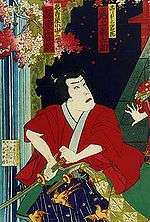Bandō Kakitsu I
Bandō Kakitsu I (初代 坂東 家橘, Shodai Bandō Kakitsu, 1847 – March 18, 1893) was a Japanese kabuki actor of the Uzaemon acting lineage, also commonly known as Ichimura Uzaemon XIV (十四代目 市村 羽左衛門, Jūyondaime Ichimura Uzaemon). He was an influential actor during the Kaei through Meiji eras of the Japanese imperial calendar. He is best known for his wagotoshi roles.
Bandō Kakitsu I | |
|---|---|
 A print made by Toyohara Kunichika in 1885, depicting Kakitsu in the role of Nagoya Kosanza in Monogusa Tarosaku Tekuda no Utaate | |
| Born | Ichimura Takematsu III 1847 |
| Died | March 18, 1893 (aged 45–46) |
| Other names | Ichimura Kakitsu V, Ichimura Uzaemon XIV, Ichimura Takematsu III |
| Occupation | Kabuki actor |
| Years active | 1847-1893 |
| Children | Ichimura Uzaemon XV (adopted) |
| Parent(s) | Father – Ichimura Takenojō V |
Early life
Bandō Kakitsu I was born in 1847, the son of kabuki actor Ichimura Takenojō V. On November 1848, Kakitsu appeared on stage for the first time under the stage name Ichimura Takematsu III.[1] His father suddenly grew ill and died on August 20, 1851.[2]
Career
In August 1868, Kakitsu took the name Ichimura Uzaemon XIV in a traditional actor naming ceremony called a shūmei. He became the zamoto (manager, troupe head) of the Ichimura-za.[1]
In November 1868, he produced the play Kanadehon Chūshingura, and played the roles of En'ya Hangan, Ōboshi Rikiya and Ashikaga Tadayoshi.
September 1871 brought debt to the Ichimura-za too great for Kakitsu to handle, forcing him to leave the theater to Fukuchi Mohei, who changed the name to Murayama-za.
Kakitsu returned in November 1871 to perform in the classic Yoshitsune Senbon Zakura.
Kakitsu appeared on stage for the last time in March 1893 in the drama Yamabiraki Meguro Shinfuji. He died soon afterward.
Notable Roles
| Year | Theater | Play | Roles | Notes |
|---|---|---|---|---|
| 1868 | Ichimura-za | Kanadehon Chūshingura | En'ya Hangan, Ōboshi Rikiya and Ashikaga Tadayoshi | Also the producer, acted in the theater he managed |
| 1871 | Nakamura-za | Yoshitsune Senbon Zakura | ||
| 1873 | Murayama-za | Taiko no Oto Chiyū Sanryaku | Sakurai, Takigawa and Ukyō | |
| 1873 | Nakamura-za | Tsuyu Kosode Mukashi Hachijō | Chūshichi | The play is also commonly referred to as Kamiyui Shinza |
| 1873 | Murayama-za | Hana Momiji Nori no Ongaku | ||
| 1881 | Shintomi-za | Kumo ni Magō Ueno no Hatsuhana | Lord Matsue | The play is also commonly referred to as Kōchiyama |
| 1881 | Shintomi-za | Tsuchigumo | Minamoto no Raikō | |
| 1886 | Chitose-za | Mekura Nagaya Ume-ga-Kagatobi | Minosuke | The play is also commonly referred to as Kagatobi |
| 1893 | Ichimura-za | Yamabiraki Meguro Shinfuji | This was his final stage appearance |
References
- Shōriya, Aragorō. "Bandô Kakitsu I." Kabuki21. 6 June 2008. 5 July 2008 <http://www.kabuki21.com/kakitsu1.php>.
- Shōriya, Aragorō. "Ichimura Takenojô V." Kabuki21. 6 June 2008. 5 July 2008 <http://www.kabuki21.com/takenojo5.php>.